
The six Canadian NHL teams have a new rival for the attention of upper elementary school students, and that challenge comes in the form of a coed Pee Wee hockey team from Tamarack, Ontario, the Screech Owls.
At the moment, the Screech Owls are only available in book form, but their play in hockey tournaments in locales like Quebec City, Florida and Sweden, plus their involvement in foiling terrorism and kidnapping, as well as their roles in solving murders and thefts, has brought them an eager reading audience. Beyond sales, recognition of the team's appeal was shown through the series' opening volume, Mystery at Lake Placid receiving the Manitoba Young Reader's Choice Award. The Screech Owls' "literary manager" is Roy MacGregor.
Children's Books by Roy MacGregor
This article is based on an interview conducted in Ottawa, May 31, 1998.
Visit Roy McGregor's home page at www.screechowls.com
Roy MacGregor
Profile by Dave Jenkinson.

Born June 4, 1948, in Whitney, on the east side of Ontario's Algonquin Park, Roy was the third of four children. "I went to public school and high school in Huntsville which is on the west side of the park. Like most kids in Canada, I wanted to be a hockey player. For a while, I was doing well in mathematics and thought about being a mathematician. I failed grade 12. In the end, failing had a good effect in that it made me smarten up. Now, when I talk to kids, I take them my 'marvellous' report card where the principal wrote at the bottom, 'Going, going,' and then added in red ink and brackets, 'You fill in the rest, Roy.' I like to show that report to teachers, and it really seems to help a lot of kids. I'm a great believer that we all have failure in us, too. It's not debilitating, and it's not the end of anything. There's nothing wrong with failing if you recover from it, and you can recover. Sometimes in talking to high school classes, I've noticed that they can't believe that someone who failed in high school has a job. They look at failing as the end of the world, and it's not. I'm also a little bit suspicious of people who haven't screwed up at least once. I don't think you can go through life just on a perfect plane. The failure was just probably the result of daydreaming. If I were in high school today, I might be identified as attention deficit. I also point out to students that the experiences of school don't translate throughout life. People who are bad at school are often very good at other things, whether it's business or journalism. Attention deficit seems to be a blessing in journalism where we're like swallows just skimming the water. For about two or three days, you're the world's expert on Libya and then you move on. I hope some kids find my having failed to be comforting."
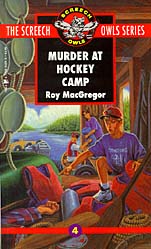
"Huntsville was one of those typical, somewhat isolated small towns in Canada. Basically, you were defined by what you did, and everyone knew what you did. Being a young male growing up in those towns, you either did sports or you didn't, and that was an instant categorization. So, if you didn't do sports, you were, if not suspect, different, and, if you did do sports, you weren't different and you weren't suspect. The tendency was for people to do sports. Doing well at sports had a compensating factor in that it didn't matter if you did well in school. In Huntsville, the culture of sports dominated over the culture of college, and I was probably far happier and felt I fit in far more being an athlete than I would have being a scholar, and so I loved sports and I played them all."
"We were a town that shifted sports by seasons as most did back then. Consequently, you played hockey all winter, and then you shifted over, particularly in Huntsville, to lacrosse and baseball and a little bit of football. I can tell the story of my being an athlete in two versions. I could tell the story in which I come off as quite a good athlete, and I could tell the story in another version. Compared to the really good athletes, I was quite an inadequate athlete, and I also wore very thick glasses. In those years before contact lenses, I used to break my glasses so much that I think my mother wanted me to quit hockey. I played forward, and, when I got lazy, a little bit of defence. I played forward in lacrosse and catcher in baseball. Looking back, I believe that, if contact lenses had been available then, it would have made me a different kind of athlete. Instead of being afraid of really mixing it up in corners, I would have lost that fear because the fear was directly connected to breaking my glasses."
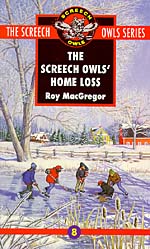 "Because it was a small town, I was usually on the all star teams in all three sports. In hockey, I played up to juvenile. We didn't have the greatest hockey group. We weren't dominant at all, but we were in lacrosse and won the All-Ontario 'A' championship. I would say I had a middling amateur career in all three sports and would describe myself as a good skater but a non-prospect for the NHL."
"Because it was a small town, I was usually on the all star teams in all three sports. In hockey, I played up to juvenile. We didn't have the greatest hockey group. We weren't dominant at all, but we were in lacrosse and won the All-Ontario 'A' championship. I would say I had a middling amateur career in all three sports and would describe myself as a good skater but a non-prospect for the NHL."
"After grade 13, there were only two universities that would take me, Carleton in Ottawa and Laurentian in Sudbury. Because a lot of Huntsville people were going to Laurentian, attending there meant I had a ride back on the weekends, something which was important because I had a Huntsville girlfriend, Ellen who's now my wife. In fact, Ellen's directly tied to my recovery of grade 12. Her family moved into town the year I failed, and her father was the chemistry teacher. I had failed chemistry so badly I had to take it again, and he, of course, knew exactly how bad I was. He also knew that I had intentions with his daughter, and so the message was pretty clear - 'shape up or ship out.'"
"The same year that I started working a little harder at school I was working at Eaton's during the summer. I used to be absolutely the laziest person that ever worked. They would always be threatening to fire me, and then I thought, 'I'm bored. I'll just flip it over and start working really hard.' I found the days went twice as fast, and I had no anxiety whatsoever. Before then, I was always frightened about getting caught goofing off. Ever since, I've been almost the reverse. I know I work too much, and I know I'm driven a bit too much. I work really, really fast, and I really like to do well now."
"At Laurentian, I did a BA in Political Science, graduating in 1970. I was going to go on further, but I just didn't. I had a chance to go to Europe, which I did. I bummed around, came back, and didn't know what I wanted to do. I actually went to Europe twice, but, when I came back the second time, it was late in the year, and I had to get a job. I got in editing at McGraw Hill Ryerson, but I don't think I was very good at it. I talked to an old teacher friend who was quitting school in Huntsville to go to take journalism. I thought, 'That sounds like a good idea. Send me the details.' He did, and I applied and got in. Going into journalism at Western was just like discovering gold. It was an awful course, but it didn't matter. What I found, and I guess what a lot of others found, because a lot of good journalists came out of there, was that all your insecurities could be put in the back pocket. In fact, you could do it. It was then I realized, 'I can be a journalist' and it was great."
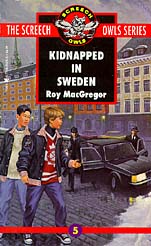
"After getting my Graduate Diploma in Journalism in 1972, I went to work in Toronto. The Telegram had folded, and so there was no newspaper work. I eventually got on at Maclean-Hunter in the business magazine section which was pretty dreary. I was a little bit forward at the time, and I started writing notes to Peter Newman, editor of Maclean's. I suggested I wanted to do a story on Tom Thomson. I had family background there, and Peter let me try it. It was pretty tortuous. Looking back, I learned a lot and made a lot of mistakes I guess, but I got a piece in Maclean's at a very young age. Then, the next thing I knew, Peter hired me to be an 'Assistant Editor' which sounds a lot better than it was. I was in charge of the slush file, the manuscripts that come in from all over, things like life stories, cartoons and recipes for things like Saskatoon berry pie. I would send back very kind notes saying such things as, 'Dear Mrs. So-and-So, Sorry, but Maclean's doesn't run recipes any more.' Once in a while you'd find a piece, and it was a neat way to be introduced to the people who were out there."
"I quit Maclean's to become a writer, and I got a chance to go to the Canadian Magazine which was then edited by a man who had been at Macleans, Don Obe. He thought I could write and offered me a writing job. It was during my three years there, 1975-78, that I became a magazine writer, and it was through Don Obe's help. I worked with people like David Cobb, Earl McRae and Tom Alderman. It was just so creative, so marvellous. And what a great life style! You had a whole month to do a piece, lots of time to rest and think. Now I'm in daily journalism, and, even though I like this much more, there's no time whatsoever."
"After the Canadian, I went back to Maclean's and was there during the time they went from a monthly to a bi-weekly. I think I'm the only person, apart from Newman himself, who worked at all three Maclean's, the monthly when it was very much a reader type magazine, the bi-weekly when it didn't know what it was, and then the weekly when it became a news magazine. I went back to Maclean's for a couple of years until Walter Stewart, editor of Today Magazine asked me to go back there, but this newspaper insert magazine didn't last very long, and, in 1981, they buried it when they killed off a bunch of papers."
"I was freelance for a while until the Toronto Star hired me as a columnist. I wasn't very good and quit the Star after two years to go back to Maclean's, the weekly, where I was the Ottawa editor, but it was not a pleasant experience. I've been a journalist for 25 years, and I've only had one bad year, that one year I spent as the Ottawa editor. Maclean's was a magazine that didn't know what it wanted to be and a magazine that was terribly abusive to its writers. I had a staff that I was trying to protect. It was an unhappy time relatively speaking. There was lots of fun involved, but it was just unhappy professionally. And so I quit there to go to the Ottawa Citizen, and I've been there for 12 years. It's been just the most wonderful 12 years I could ever hope for. I worked out of Parliament Hill for six years, and then, when the NHL Senators started up, they asked me to consider switching over to hockey, I did, and that's proved to be very good. I'm about to leave the Citizen now for the new newspaper, the National Post, where I'll go back to much more general stuff and some politics."
Roy's beat at The Citizen was essentially hockey. "A lot of sports don't interest me, and I'm not a jock. I can't remain conscious for an entire baseball game, and I can't fathom how things like horse racing and car racing became perceived as sports. I like to play lots of sports, but to be a fan, no. I'm not much interested. I love hockey in an entirely different way than as a sport though. It's who we are. It's not what we do. It's a cultural phenomenon rather than an athletic phenomenon, and, to me, studying the number one game of a country is every bit as valid as studying the politics of a country, and that's why I'm just hypnotized by it. I love it. Everything that happens in hockey tells us something about who we are and where we came from and where we're going. I know that sound high faluting and fantasy thinking, but I really do believe that. Whenever I read or hear people saying, 'Sports isn't culture. Hockey isn't culture. The CBC should get rid of hockey.' I just shake my head. To me, the CBC's mandate should be delivering things like hockey and parliament because that's what makes up the country."
The same passion Roy brings to talking about the game of hockey he brings to discussing writing which involves hockey. "If you want to talk about hockey and literature, let's get at it. It astonishes me, and I've tried to understand why it is, that, first of all, hockey, as a theme in literature, is not taken seriously. Secondly, when I did do a hockey novel, The Last Season, and no one would know this, but it began as a political novel that wasn't working out, I wanted to write about the Polish experience in Canada, but, after 50 pages, I ended up going back to hockey. When the book came out in 1983, booksellers didn't seem to know where to place it. 'Is it a juvenile book? 'Is it a sports book?' No one thought to take the damn thing and put it out with new fiction, and the book bombed. It got wonderful, wonderful reviews, but it was a complete and utter disaster as a seller."
"I've tried to figure out so many times why it is that hockey doesn't seem to register on the CanLit scale. How can it be that so many American writers came up through sports writing, but, in Canada, we've either written about it at a child-like level, Scott Young, or we've written at it from an embarrassing level, which is the 'as-told-to', those endless kind of enlarged hockey cards that are sold as books. In publishing terms, the 'hockey book' became a 'niche' so that publishers would say, "Is it a hockey book? It's going to sell four to twelve thousand copies, and it'll be our Christmas market.' Quality doesn't matter; subject doesn't matter. It's just a hockey book. There've been a number of breakthroughs obviously, but there has been no acceptance of hockey as part of CanLit. Sometimes I wonder if it isn't because, to me anyway, CanLit is dominated at an academic level, and academia and sports have never been a congenial mix. I'd even argue that we are a short story country, and proudly hail being a short story country all the time which, to me, is largely because of creative writing classes; the short story fits into the creative writing class, and the short story largely sells to people who study creative writing. The short story is an economic viability in Canada far more than writing books is because you can sell them to magazines and can actually make more from short stories. As a result, the literature of our game is either pedestrian, poor or nonexistent. There are the rare jewels, like Ken Dryden's The Game and a few others."
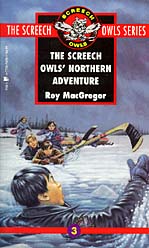
"And that's why writing "The Screech Owls" books has been such an intriguing experience for me. The idea for the books was the publishers. Doug Gibson at McClelland & Stewart phoned me up and said, 'We're hearing back from librarians and educators, and they say there's this reluctant reader out there, boys 9-13, that they can't get to read anything. Boys say the same thing all the time, "There's nothing I like." Why don't we do some hockey books? Nothing's been done for nearly 50 years since Scott Young sat down and wrote Scrubs on Skates. You could look at this from a financial point of view. Those books have been like a little RRSP for Scott.'"
"I went away and thought about it for awhile. I'd never written for kids and never been caught up in kids books apart from when I was a kid. I came back to Doug and said, 'I don't think hockey's enough. Hockey's almost all that's in the Scott Young books. There are other themes. I'm not belittling Scott's books -- in fact, I like them as much now as I did as a kid -- but it's the 1990's now and the fact of the matter is hockey is not as all pervasive as it once was. When I was a kid, everybody knew who played hockey. Now I ask my son who plays hockey at school, and he says, 'I don't know. There's no jackets any more.' I said to Doug, 'Why don't we use the best methods for getting kids to read books, and that, to me, is mystery or adventure. I think I can invent a team, and we'll have them travel around so we've got different locales and we'll always try to have a mystery in there."
"'Screech Owls' was McClelland & Stewart's first venture into children's books. They had bought Tundra and had all these people there that supposedly knew a lot about kids books. I admire them hugely for coming up with the idea. I accept it, but it has been a learning experience I think for them as well as obviously for me. The idea was Doug Gibson's and not mine. I don't want to pretend otherwise. The Screech Owl name was mine though. I just love the word 'screech.'"
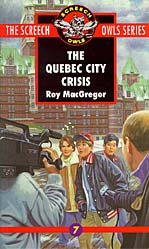
"I remember the first time I said I wanted to do a murder in a Screech Owls. They just had a conniption at McClelland & Stewart. Doug said, 'We've had a meeting, and there's grave concern here about your plan to have a murder.' It was in #4, Murder at Hockey Camp. I replied, 'You can't be serious? We're talking about 9 to 11 year-old boys who've seen 130,000 murders by now on TV.' To which Doug responded, 'Well, it's different in a book. We have teachers coming down on us.' ' Well,' I said. 'Will you grant me one thing? Will you let me go to a couple of classes and ask their opinion.' I talk to classes quite often, and so I held votes. Well, the kids thought I was the stupidest person that they'd ever seen. Can you imagine asking a class of grade 5 kids, 'Do you think you're ready to solve a murder?' So now, we've gotten over that barrier. But it's always barriers, isn't it?"
"Initially, I had a contract to write three books, the same as Scott Young had started with. Then the books started to do well, and, The Night They Stole the Stanley Cup really took off, which I believe had everything to do with those two words, 'Stanley Cup.' McClelland & Stewart wanted more, and they started selling them to other countries like Sweden and France. I'm quite upset about the French version. They've dropped it down to about a 7-8-year-old level, taken out all the stuff which might make someone a little squeamish and all the adult-based humour."
"Kids always ask why the first one is longer than the others, and the reason is spelled 'm-o-n-e-y.' The publisher's costed them out and decided that they can keep the price at $4.99 if they have 114 pages. I love Mystery at Lake Placid's size, nearly 200 pages, so much better. I'd love to write a few more at that length. Kids, by the way, know the books better than I do, and they know when I screw up and come down on me like a ton of bricks. Sarah was the first major one, and that was just stupidity on my part. I was thinking lineally. If you play hockey on a team and, let's say, you go to a tournament in Lake Placid one year and the next year you go to another in Toronto, the team will have changed. Consequently, I changed a whole bunch of players on the team, including Sarah. I got a few complaints from the kids about her being gone, plus I realized I'd lost a key protagonist, especially with her interplay with Nish which had now become central as Travis starts receding more and more. Travis is a character all right, but he just observes and tells the stories. What I did to bring Sarah back was, and the kids caught this right away, I brought her in as a guest. In Murder at Hockey Camp, I explained her playing for the higher level team, but, in later books, I just stopped. Doug said, 'Do you think you should be explaining any more?' and I just answered, 'I don't think so. If any kid ever wants to know, let's just say, 'The writer screwed up and leave it at that.'"
"I've learned so much in writing these books through what kids write. Recently, I got a letter from a boy who said, 'I think you're hurting Sarah too much. Those skates were hurting her in Mystery at Lake Placid, and she was bleeding. In Murder at Hockey Camp, she gets hit by Nish, and, in Kidnapped in Sweden, she burns her wrists on the ropes and can hardly play.' And I thought, 'How astute of this kid. Of course, he's right, but I had done it because I want to portray Sarah as a real hockey player, and, because she's a girl, I want to demonstrate that she has courage, every bit as much courage as any male player throughout history, but I'd gone overboard. I hadn't realized that I'm too self-conscious about who Sarah is, and so I wrote him back and said, 'You're right, and I'm changing.' By the way, I write them all back because I figure, if kids spend enough time to write you a letter, you owe them one back."
While the books' plots are obviously invented, Roy has drawn on some of his own experiences for particular episodes. For example, in The Screech Owls' Northern Adventure, Travis and some others get caught in the bush during a sudden snow storm. Explains Roy, "If you read one of my adult books, Chief which is about the Diamond family, you'll find a similar story, but it started on water, not land. Four of us - Charlie Diamond, a friend of his and another friend of mine, plus me - had gone out in a boat, and we got caught in a freak storm in James Bay. We barely made it to an island. It was a harrowing experience because, even though it was near summer, the snow was falling. The enterprise of these two Cree hunters was amazing, and my friend and I were warm as toast sitting around a fire eating white fish the other two had just caught in a net. We were there for three days before they could locate us. It was truly an amazing experience for me, and so I wrote about it while changing it a bit. In Waskaganish, they think The Screech Owls' Northern Adventure is a riot. They read it and recognize people from the community."
"A lot of the kids and teachers say they like the books' hockey sections because it's 'real' hockey, but I play hockey three times a week, and so it's just pure fantasy in my mind. I never have to research any of that stuff. The tournaments the Screech Owls play in aren't all real. Obviously the Quebec one is, but the one in The Night They Stole the Stanley Cup I 'stole' from a tournament called 'the Little NHL' that I played in back in my Bobby Orr days. I don't think it exists any more. The tournament in The Screech Owls Northern Adventure is a true tournament, but it only has native teams. Those in other books like Terror in Florida and Kidnapped in Sweden are invented."
As to the books' settings, Roy says, "I haven't faked one yet. With Terror in Florida, for example, I had a break between a hockey game in Tampa and Florida last spring, and so I rented a car, drove out to Disney World and did the terror ride. I just went with a notebook, took some quick notes, decided where I could place certain things and how I might work in a mystery or whatever. Because kids from western Canada have been writing saying that I haven't set a book out in their part of the country, the next place I'm toying with is Drumheller and the dinosaur area. Because I've never been there, I'll have to go."
"I'm just waiting for a kid to ask, 'Where do they get the money to go to all these tournaments?' With Nightmare in Nagano, it's been just hilarious trying to figure out how I can fake that one. I've decided that several years ago the Screech Owls' community, Tamarack, and Nagano twinned, and so the people of Nagano are going to put up them up for free. And because Canadian Airlines is trying to promote its new connection to somewhere, they're going to give them free passes. Even as I was typing all this, I was saying to myself, 'Some day someone's going to realize that these kids have to be multi-zillionaires.' No one could afford to live like these kids do."
"In the first book, the team's international makeup was done tongue-in-cheek. I had a reporter from the Toronto Star writing about the team as 'Team United Nations.' It was a spoof on being politically correct, but I don't think I carried it off very well, and then I stuck with it. While I'm spoofing political correctness, at the same time, I'm acutely aware of the needs. As an author, I may be unusual in that, until recently, I coached these same groups for many, many years, and, over that time, I had a great awakening. In the community of my childhood, the real 'strange' people were Italians who came over to Canada to work in the tannery, and so I had friends with surnames like Terziano and Figalucci. These were the 'exotics.' And now in the 1990's when I'm coaching hockey, I've got kids on my teams with names like Sareen and Faud. And there are girls and Blacks and Asians."
"As the series goes on, I'm trying to bring other players to centre stage. For example, Lars wasn't in the earlier books, and he's become a major character. Jenny, the goaltender, is going to be one of the stars of the Nagano book, and that's partly because I'm going to describe her with red hair. Because Doug Gibson knew of the Japanese fascination with L.M. Montgomery's Anne Shirley, in a facetious moment he said, 'If there was a way to get a little red-haired girl into a book on Japan ..., and so I did it to see if he notices. In The Screech Owls' Home Loss, the evil villain was Old Man Gibson, and I got a letter from Doug saying, 'What's going on here?'"
In the opening book of the series, Mystery at Lake Placid, Travis Lindsay provides a "scouting report" on each of his teammates. That of Wayne "Nish" Nishikawa concludes, "Clean player, dirty mind." Like many early adolescent males, Nish is curious about things 'sexual,' and he expresses that interest in very juvenile ways. For example, in the opening book, Nish "bought a pen with a bathing beauty on it and when you turned the pen upside-down the bathing suit seemed to peel off. But you couldn't see anything." In Terror in Florida, he purchases X-ray glasses, explaining, "You know, see right through things. See right through things like bathing suits. You get what I mean?" The Night They Stole the Stanley Cup finds Nish unsuccessfully trying to rewire the remote box on the TV in one of the team's hotel rooms in order to watch 'adult' movies, something he had also attempted in Mystery at Lake Placid.
So far, McClelland & Stewart has had no problems with Nish. Says Roy, "The only thing that McClelland ever asked me to change was the number of swear words I had in the first book, and I've cut back on the swearing because I realize it's a lightening rod. Regarding Nish's character, I've had two complaints. A teacher in Cornwall tried to get the books banned there because of the "boobs"' reference in Mystery at Lake Placid where Travis remarks, "He [Travis] heard Nish, the team pervert, giggling that two of the rounded hills off in the distance looked like 'boobs.' Nothing unusual there. Nish was so crazy he once said that the face-off circles reminded him of two big boobs out in front of the net." When Kidnapped in Sweden was up for Ontario's 'Silver Birch Award, a readers' choice type award, a teacher from Pembroke was quite upset about Nish and his boorish behaviour. We had long exchanges of correspondence over this. She hadn't read any of the other Screech Owl books, and I assured her that Nish was a far wilder character in the other books than he is in this one. In her response, she said, "I have six Nishes in my class,' to which I replied, 'What a great opportunity to discuss boorish behaviour. As well, you always have Sarah there who is the foil for Nish. Sarah deflates him all the time.' Well, I never heard from her again."
"It's ironic that I got blasted for being sexist or whatever when, in fact, the thing that really terrified me was getting nailed for being a moralist. Mystery at Lake Placid's about parental pressure, and, while The Night They Stole the Stanley Cup seems like it's about the theft of the cup, it's really about shoplifting. The Screech Owl's Northern Adventure is about cultural acceptance , and The Quebec City Crisis is about my own profession, political writing, and is, I think, a nasty condemnation of journalism. Terror in Florida is about what terror is and how you can have real terror and phony terror. I'm too much of a moralist."
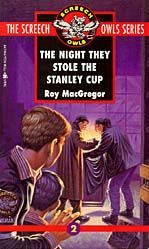
"Kids absolutely gobble these books up, and some would read through all of them in two weeks and then want the next one. I cannot keep the pace up. I get so many demands from kids, 'Where's the next one? What's the next one? How come you don't write faster?' And now my publisher's harassing me, too. Originally, I was doing two a year, and then it went to three. and they were hoping for four this year. The one I'm working on now is set in Nagano in Japan. I was in Nagano to cover Olympic hockey for the Ottawa Citizen. I remember arriving and thinking the setting was marvellous. I walked into the residence where I was staying and went into the bathroom and saw a dial on the side of the toilet. It was a heated toilet seat, and you can just crank it up. I remember thinking, 'This is Nish,' and so Nightmare in Nagano begins with Nish's having just discovered the toilet."
"At the moment, I've written 17 books, eight adult and nine kids. I don't know why I'm so prolific. It's as much a mystery to me as to anyone. I write very, very quickly. In terms of the Screech Owl books, I will mull a story over in my head for months while I'm doing other things like walking the dog or driving. Eventually I sit down and do an outline. If I had uninterrupted time, I think I could write a Screech Owls book in about five days. Mostly, though, they take a month. Apart from my day job, the Screech Owls are what I'm concentrating on, and then that's during early mornings and evenings. As a sports reporter, I've had a very flexible day job. When I'm covering a hockey match, I can get up early in the morning and can work on these books before I go to what's called the 'morning skate'. After that, I have most of the afternoon off, and maybe I can throw an hour in there. And then I work at nights covering the hockey. While I have a very flexible life style, obviously I'm very organized and committed."
Roy describes himself as "a very 'clean' writer,' meaning that his work requires little editing in terms of its mechanics, but he admits that "I tend to write easily a third too much so that every book, almost without failure, has come back to me in galley form requiring that I cut 30 pages out of it. I can usually get the first 20 pages quite simply. If the last page of each chapter has just a few lines on it, then I can go through the 20 or so chapters cutting sentences here and there and tightening things up until those 'extra' pages aren't needed."
And some time, young readers may be able to see the Screech Owls as a TV series. "A British company that bought the TV rights has been in Toronto for several months trying to get a Canadian carrier lined up, someone like CBC or YTV. They have British, Scandinavian and French interest, but they can't get Canadian interest. It's been very discouraging for them, but they still think they're going to do it."
"The Screech Owls Series" has been used by the Toronto Maple Leafs in a literary project they did two years in a row in conjunction with Frontier College. They used The Night They Stole the Stanley Cup and The Screech Owls' Northern Adventure. The Leaf players would each read a chapter or so, and a tape would be sent out to schools. It wouldn't tell the whole story, of course, but, after hearing players like Mats Sundin, Doug Gilmour and Larry Murphy read a chapter, the kids would get pretty fired up to finish the book. Tie Domi's three minute section took him 90 minutes to 'read' because he can't read. When I tell kids this in schools, they laugh and roar, and I always add, 'Tie could have said, "No".' They think about that for a while, and then I say, 'Isn't it interesting that Tie Domi is concerned enough about reading that he would humiliate himself publicly just so that you kids would get fired up enough to read?' And then they go, 'Yah,' and I say, 'Makes you think that Tie Domi must believe that reading's important even if he can't read.' 'Yah,' they reply."
"Because this is the first time I've ever been involved in writing a series, the neat thing I've found is that I don't have to think any more. I just sit down, and I see the location. Because Nish is already created, he almost walks in, and, in the case of Nightmare in Nagano, he starts fiddling around with the toilet seat. I don't have to create anybody, and, I realize, that's the real time saver of a series. Characters already exist. Half of your work in a book is creating the characters. Now my work is creating the plot, and that's it. Locale's easy; character is done, and so I just need the plot."
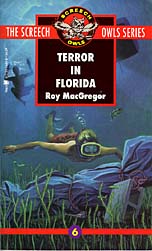
To date, Roy has dedicated two of the Screech Owl books to former teachers. Murder at Hockey Camp recognizes Clyde Armstrong. Roy explains, "When I was screwing up in high school terribly, Clyde was an English teacher there. He was a really nice person, and he took me aside and said, 'I'd like to start up a school magazine, and I'd like you to be the editor.' And I asked, 'Why me?' And he replied, 'Because I think you can do it, and I think you'd enjoy doing it.' My marks, despicable in all the other areas, weren't that great in English either, but he saw something in me and got me writing. That's the first time I had ever really written. Then, when I saw my byline, I realized the intoxicating effect that it has on you. I guess I was hooked from that point on, and so I owe him a huge debt."
The copyright page of The Screech Owls' Home Loss begins: "For Miss Mern Parker, grades 3-5, Huntsville Public School 1955-57. 'A teacher's teacher.'" Roy's having failed grade 12 may have suggested that he was always a poor student, but earlier in public school he had skipped a grade. "I did three, four and five in two years, and Miss Parker was my teacher. Quite an elderly lady now, she still lives in Huntsville. I met her walking down the street one day when I had three of my kids with me. I stopped her and said, 'Miss Parker, these are my kids,' and I said to the kids, 'This is the greatest teacher who ever lived.' And I thought she was going to start to cry. I remember thinking at that moment, 'Good teachers don't get enough feedback.'"
